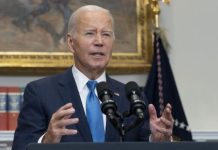
SEOUL, Feb. 12 (UPI) — More than 40 percent of North Koreans are in serious need of humanitarian assistance, including food and nutrition support and improved access to basic services such as health, clean water, sanitation and hygiene, according to a funding report released by the United Nations Office for the Coordination of Humanitarian Affairs.
In its Provisional Needs and Priorities Overview, released on Monday, the United Nations found that 10.4 million North Koreans out of a population of 25 million are in need of aid, including 10.1 million who are food insecure.
The overview said that “deterioration of critical agricultural infrastructure and recurrent natural disasters” are to blame for the food shortage. North Korea suffered its worst drought in decades in 2019, alongside heatwaves and flooding.
Many international observers, however, including the U.N.’s Office of the High Commissioner for Human Rights, also place blame for the shortages on the North Korean regime’s heavy-handed control of food production and distribution and use of state funding on its military and weapons programs.
One-third of children ages 6-23 months do not receive the minimum acceptable diet, the U.N. funding overview stated, leaving one in five children suffering from chronic malnutrition.
Around 33 percent of the population, or 8.4 million people, do not have access to a safe water source, while one in five does not have access to even basic sanitation facilities. Some nine out of 10 people in rural areas face potentially deadly health risks due to unsafe disposal of human waste.
The United Nations is seeking $107 million in financial assistance for 2020 but noted that funding levels for the “acute food, nutrition, health, water and sanitation needs” in North Korea remain “historically low.”
Last year, the U.N.’s humanitarian appeal was only 28 percent funded, with $32 million received out of a targeted $120 million. Just 2.5 million of the 3.8 million people initially targeted for assistance received aid.
This year, the United Nations is hoping to provide aid to 5.5 million people, with a focus on women and children.
At the end of January, international aid organization CARE listed the situation in North Korea as one of its top 10 under-reported humanitarian issues of 2019 in a report.
North Korea remains under tight international economic sanctions, but exemptions are granted for humanitarian assistance. However, a lack of transparency and restrictions on access for aid workers have long been an impediment for aid groups operating in the country.
The outbreak of the novel coronavirus, which has killed over 1,100 people, primarily in China’s Hubei province, is putting a further strain on North Korea, hampering economic activity and threatening a medical infrastructure ill-equipped to handle an outbreak.
North Korea has not officially reported any cases of the virus and says it is working with the World Health Organization. Pyongyang has intensified efforts to contain the illness, including tightening its borders with China and Russia and imposing quarantines and travel restrictions.





